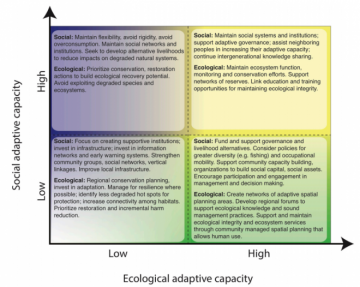
This conceptual framework relates degrees of adaptive capacity across social and ecological systems and highlights the key features that define adaptive capacity assessments between these systems. Image: Figure 3 from ‘Adaptive capacity: from assessment to action in coastal social-ecological systems.
Coastal ecosystems are undergoing complex changes caused by both social and ecological drivers occurring at varying scales and speeds, which ultimately act as either risks or opportunities to coastal social-ecological systems. The assessment of adaptive capacity- the latent ability of a system to respond proactively and positively to new stressors or opportunities- of coastal ecosystems is crucial in understanding the extent to which they will be able to accept and adapt to these social and biophysical drivers.
A new paper co-written by CORU Director William Cheung in Ecology and Society addresses the discrepancies and ineffectiveness present in previous efforts to establish adaptive capacity recommendations by attempting to improve the consistency and quality of adaptive capacity assessments.